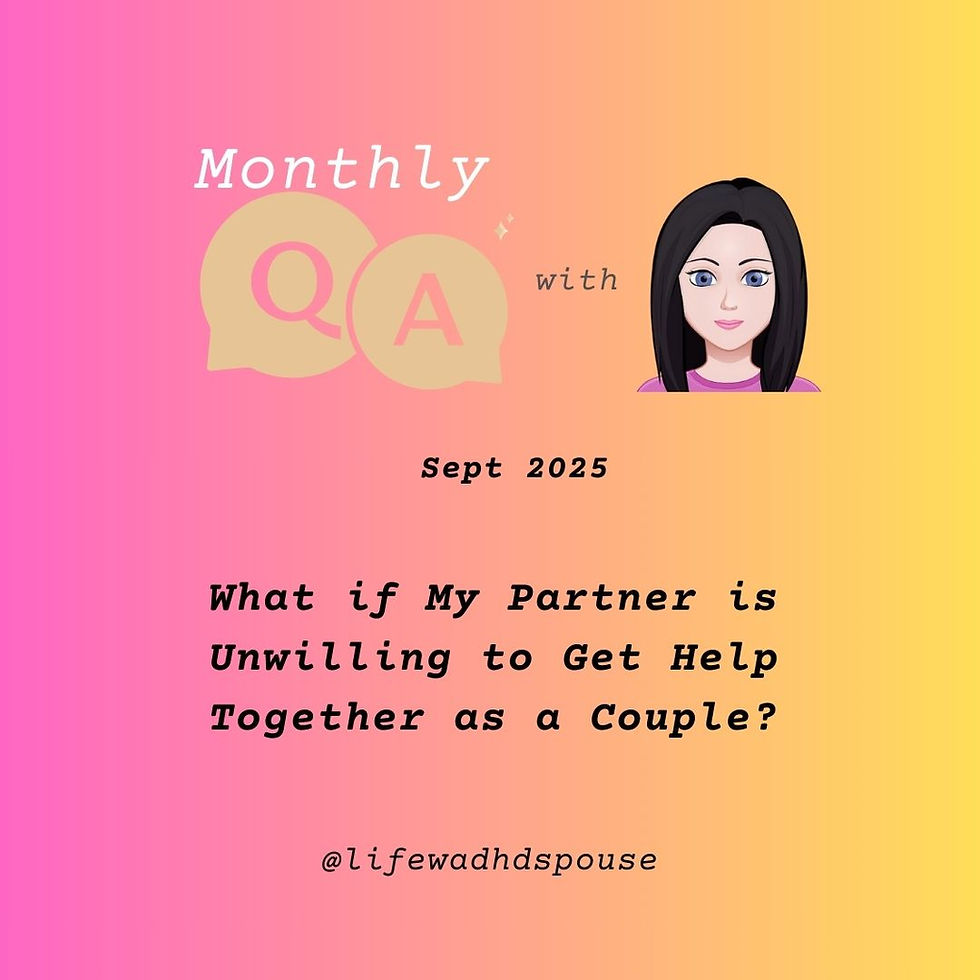What if My Partner is Unwilling to Get Help Together as a Couple?
- Alice S

- Sep 2, 2025
- 3 min read

Question:“I know our relationship would benefit from outside help, like therapy, consulting or coaching, but my partner doesn’t want to get help. What do I do when I feel like I’m the only one willing to work on this?”
Answer:This is such a common and painful situation, and you’re not alone in facing it. From the couples I’ve spoken with, I see both sides—sometimes it’s the ADHD partner, sometimes it’s the non-ADHD partner—who resists getting help together.
There are many factors that play into one partner being unwilling to seek help when the other is ready, and those reasons often boil down to the following:
When the ADHD partner resists:
Fear of being blamed or judged. They may assume a counselor or coach will “side” with the non-ADHD partner.
Shame or denial. It can feel like admitting their ADHD is “the problem.”
Past negative experiences. A bad run with therapy, school interventions, or authority figures makes it hard to trust the process.
Feeling overwhelmed already. Adding one more responsibility feels impossible, even if it’s supposed to help.
When the non-ADHD partner resists:
Exhaustion or burnout. They may feel they’ve already been carrying the load and don’t have the energy for “more work.”
Hopelessness. After years of struggles, they may believe “nothing will change” even if they try counseling.
Fear of uncovering more pain. Avoiding help feels safer than reopening old wounds.
Belief that their partner is the one who really needs help. They may see counseling as unnecessary for themselves since ADHD feels like “their partner’s issue.”
Knowing why resistance shows up is important, but the next step is figuring out what you can do when it happens. Here are four options that give you a starting point:
1. Work on your side first
Even if your partner isn’t willing to get help together, you can still benefit from support on your own. Meeting with a coach, therapist, or consultant can help you:
Learn what behavior is related to ADHD and what isn’t.
Get clarity on your boundaries and needs.
Learn strategies that reduce resentment and burnout.
Model healthy self-care and growth, which can influence your partner more than pressure ever will.
Sometimes, the best way to encourage your partner is by showing—not telling—the positive changes happening in you.
Especially for non-ADHD partners who have been in a long-term relationship where their partner was only recently diagnosed, I strongly encourage you to get support on your own. Chances are, you’ve developed assumptions and coping patterns around your partner’s ADHD symptoms that may no longer serve you. Having someone who truly understands ADHD can help explain the root cause and guide you toward new solutions that work better for both of you, so you don’t repeat old patterns.
2. Shift from “convincing” to “inviting”
When we want something badly, we often slip into convincing mode—listing all the reasons why counseling would help or pushing for a commitment. But that can make a partner feel criticized or cornered. Instead, try an invitation approach:
Frame help as a way to make life easier for both of you, not as a punishment.
Suggest small, low-pressure steps (like reading an article, listening to a podcast, or trying one session).
Leave the door open—sometimes resistance softens over time when the pressure is off.
3. Focus on what you can control
You can’t force a partner to change. What you can do is:
Set clear limits around what you need to stay healthy in the relationship.
Decide how you’ll respond if the dynamic doesn’t change.
Take responsibility for your own growth and emotional stability.
This isn’t about “doing the work for both of you”—it’s about making sure you aren’t stuck waiting indefinitely for your partner to be ready.
4. Remember: progress can happen even if it’s uneven
It’s easy to believe that both partners must engage equally for things to get better. While equal engagement is ideal, many couples begin their healing because one partner takes the first step, just like my relationship. Your efforts may eventually spark curiosity or willingness in your partner. But even if they don’t, you’ll still be moving toward a healthier version of yourself—and that clarity matters because it allows you to better communicate your needs to your partner.
Takeaway:If your partner isn’t ready to seek help together, it doesn’t mean you’re powerless. You can seek support for yourself, shift how you approach the conversation, and decide what boundaries are necessary for your own well-being. Sometimes, working on your own growth is the very thing that opens the door for your partner to step into theirs.
.png)



Comments